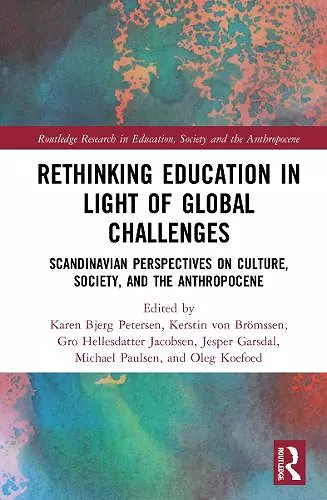Rethinking Education in Light of Global Challenges
Scandinavian Perspectives on Culture, Society, and the Anthropocene
Oleg Koefoed editor Michael Paulsen editor Jesper Garsdal editor Karen Bjerg Petersen editor Kerstin von Brömssen editor Gro Hellesdatter Jacobsen editor
Format:Hardback
Publisher:Taylor & Francis Ltd
Published:25th Nov '21
Currently unavailable, and unfortunately no date known when it will be back
This hardback is available in another edition too:
- Paperback£39.99(9781032108209)

Rethinking Education in Light of Global Challenges discusses challenges to education in Scandinavian welfare states due to global trends like migration, neoliberal strategies, and the exploitation of nature. This anthology comprises case studies, theoretical articles, and reflective studies, grouped under the headings of Culture, Society, and the Anthropocene.
This book directly addresses three interrelated global events and their implications for education as seen from Scandinavian perspectives: migration flows, increased cultural diversity, and (post)nationalism; the erosion of the welfare state and the global rise of neoliberalism; and the Anthropocene and environmental challenges arising in the wake of the global exploitation of natural ecosystems. In case studies, theoretical articles, and reflective studies, researchers from Nordic countries explore how education, education policy, and educational thinking in these countries are affected by these global trends, bringing to the fore the different roles education can play in addressing the various issues and different ways of reimagining education.
This authoritative volume will be of great interest to researchers, academics, and students in the fields of sociology of education, migration and education, environmental education, and educational politics.
"Compulsory education is a powerful tool for instilling a nation's core values, norms and concerns in young people. Cultures are constantly changing and mixing, but at certain times this becomes more obvious, with its content of hopes, threats, and challenges. One thesis in this book is that three parallel phenomena today affect education throughout the world: neoliberalism as hegemonic discourse, cultural and demographic change related to migration, and climate change due to human activities in the era known as the Anthropocene. Three Nordic countries - Denmark, Norway, and Sweden - are focused as examples of how these phenomena works and what can be done to take advantage of new opportunities and counteract problems. A key theme is the opposition between learning for multifaceted insight on one hand, and instrumental learning as a prerequisite for economic competition in a globalized market on the other. How the growing cultural diversity in the Nordic countries relates to different ways to regard learning is crucial, and these texts provide critical reflections on the specifically Nordic management of tensions between globalization, multiculturalism, and neo-nationalism. The concept Bildung is constructively used to describe the necessity for such kind of learning that emphasizes ability to shift between broad outlooks and individual wants and views. The mix of empirical results and philosophical investigations make this book useful for a variety of readers on issues that concern us all." -- Professor Inga Wernersson, University West, Sweden
"Compulsory education is a powerful tool for instilling a nation's core values, norms and concerns in young people. Cultures are constantly changing and mixing, but at certain times this becomes more obvious, with its content of hopes, threats, and challenges. One thesis in this book is that three parallel phenomena today affect education throughout the world: neoliberalism as hegemonic discourse, cultural and demographic change related to migration, and climate change due to human activities in the era known as the Anthropocene. Three Nordic countries – Denmark, Norway, and Sweden – are focused as examples of how these phenomena work and what can be done to take advantage of new opportunities and counteract problems. A key theme is the opposition between learning for multifaceted insight on one hand, and instrumental learning as a prerequisite for economic competition in a globalized market on the other. How the growing cultural diversity in the Nordic countries relates to different ways to regard learning is crucial, and these texts provide critical reflections on the specifically Nordic management of tensions between globalization, multiculturalism, and neo-nationalism. The concept of Bildung is constructively used to describe the necessity for such a kind of learning that emphasizes the ability to shift between broad outlooks and individual wants and views. The mix of empirical results and philosophical investigations makes this book useful for a variety of readers on issues that concern us all." -- Professor Inga Wernersson, University West, Sweden
ISBN: 9781032108193
Dimensions: unknown
Weight: 453g
246 pages